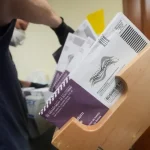
Gone are the days of throwing people in the slammer and letting them sit without giving them a chance to develop themselves into responsible, hardworking citizens.
There are a variety of programs and courses available to people serving time. One heartwarming program mentors inmates to train and rehabilitate homeless dogs, turning unwanted pups into well-mannered star pupils ready for families.
Some inmates get the opportunity to continue their education behind bars, reentering society with their GED or certificates, improving their educational standing and vocational skills.
And some programs allow inmates to get outside, get their hands in the soil and develop a priceless skill: growing food.
Trending:
Everyone has to eat, and gardening allows former criminals to quite literally get down to the ground level and build themselves new lives.
The Missouri Eastern Correctional Center in St. Louis County, Missouri, participates in an impressive gardening program and has donated countless pounds of fresh, wholesome produce to underserved communities for years.
The correctional center’s Facebook page keeps followers apprised of their progress, and their page is full of images depicting bountiful harvests.
“Very proud of the hard work Case Manager Parr and the Restorative Justice Offenders have achieved this year gardening,” the Missouri Eastern Correctional Center posted in July.
“Just look at all these fresh vegetables! Over 200lbs of produce donated just this week to Feed My People Food Bank.”
“We are so excited to share that the Restorative Justice Organization of Missouri Eastern Correctional Center just keeps pumping that fresh produce out the door to serve our community,” they shared in August.
“RJ donated 1,939 pounds of produce last week and 2,140 pounds this week. Year to date total = 16,319 pounds!!!! WOW! They aren’t done yet, much more produce still to come. Stay tuned for more updates.”
An update in September announced that they’d donated a total of 18,141 pounds — and they’re only one of the groups participating.
Known as Restorative Justice Gardens, the program is implemented at many Missouri institutions and has resulted in a staggering amount of food being grown and distributed to some of the state’s most needy.
“The Department of Corrections cultivates Restorative Justice Gardens in institutions throughout the state,” the Garden page on the Missouri Department of State Correction’s website stated.
“Staff members work with offenders to grow produce for low-resource Missourians in need of fresh food, yielding as much as 100 tons of fresh fruits and vegetables for donation to Missouri food banks, shelters, senior centers, schools and other organizations.”
Through these kinds of programs, inmates not only gain valuable life skills and increase their own self-sufficiency, they get to work hard, enjoy nature and engage in charity — all in the hopes that they will be able to lead productive, connected lives once they regain their freedom.





